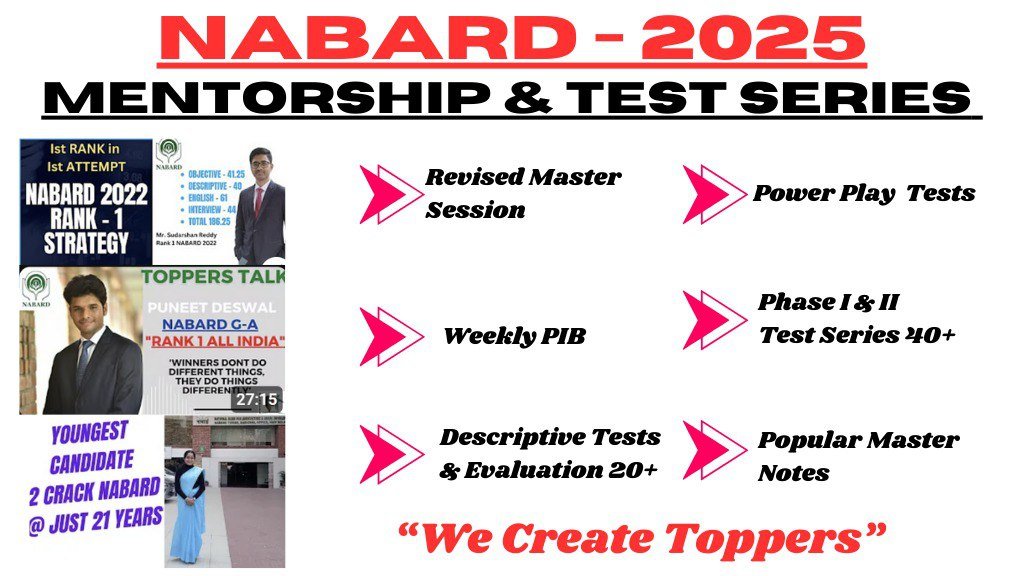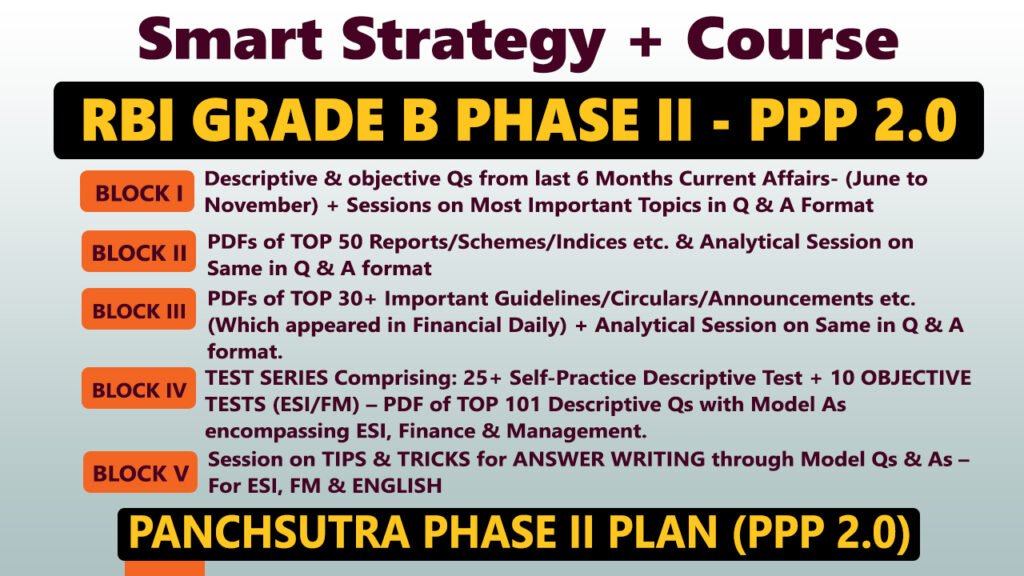The syllabus of RBI Grade B https://learn.c4scourses.in/learn/RBI2025 covers various topics like General Awareness , Quantitative Aptitude , English Language , and Reasoning. It also covers social issues and economic issues, Finance and , Management and also includes descriptive papers for Phase-2.
We are providing you the best guidance for your RBI Grade B 2025 exam :
Get yourself enrolled for the best mentorship of RBI Grade B 2025
The RBI Grade B exam consists have been categorized into three parts :
- General ( DR ) : This section includes Reasoning, Quantitative Aptitude, English Language, and General Awareness.
- DSIM
- DEPR
RBI Grade B Phase 1 Syllabus
| English Language | Reasoning Ability | Quantitative Aptitude | General Awareness |
| Reading Comprehension | Puzzles | Data Interpretation | Indian Banking System |
| Cloze Test | Seating Arrangements | Inequalities (Quadratic Equations) | Indian Financial System |
| Fillers | Direction Sense | Number Series | Govt. Schemes and Policies |
| Error Detection | Blood Relation | Approximation or Simplification | Current Affairs |
| Vocabulary based questions | Syllogism | Data Sufficiency | Static Awareness |
| Sentence Improvement | Order and Ranking | Miscellaneous Arithmetic Problems | Monetary Plans |
| Jumbled Paragraph | Coding-Decoding | Quantity Comparison (Q1 & Q2) | National Institutions |
| Phrase Replacement/ Phrase Correction | Machine Input-Output | Banking Terms | |
| Match The Column | Inequalities | ||
| Word Swap | Alpha-Numeric-Symbol Series | ||
| Word Rearrangement | Data Sufficiency | ||
| Idioms | Logical Reasoning (Passage Inference, Statement, Assumption, Conclusion, Argument) | ||
| Paragraph /Sentences Restatement | |||
| Paragraph Based Questions | |||
| Paragraph Fillers |
RBI Grade B Phase 2 Syllabus for General ( DR )
In the phase 2 of the examination RBI Grade B officer there are three papers mentioned below :
- Paper 1 ( Economic and Social Issues )
- Paper 2 ( English Writing Skills )
- Paper 3 (General Finance and Management)
Syllabus of Paper 1 ( Economic and Social Issues )
| CATEGORY | KEY TOPICS |
| Growth and Development | 1. National Income and Per Capita Income 2. Poverty Alleviation and Employment 3. Sustainable Development and Environment |
| Economic Landscape | 1. Economic History 2. Industrial and Labor Policy Changes 3. Monetary and Fiscal Policy 4. Economic Survey and Union Budget Policies |
| Financial System | 1. Money and Financial Markets 2. Role of Banks and Reserve Bank of India 3. Public Finance 4. Political Economy’s Influence |
| Economic Sectors | 1. Industrial Developments 2. Importance of Agriculture 3. Services Sector Growth |
| Globalization | 1. Opening Up of Indian Economy 2. Balance of Payments Explained 3. Export-Import Policy 4. International Economic Institutions ( IMF, World Bank, WTO ) 5. Regional Economic Cooperation and International News |
| Social Structure | 1. India’s Multiculturalism 2. Demographic Trends and Analysis 3. Urbanization and Migration Impact 4. Gender Issues and Social Justice |
Syllabus of Paper 2 ( English Writing Skills )
The RBI Grade B Syllabus 2025 for Phase 2 Paper II will be descriptive. The paper on English shall be framed in a manner to assess the writing skills including expression and understanding of the topic.
Syllabus of Paper 3 ( Finance and Management )
| CATEGORY | TOPICS |
| Financial System | Structure and Functions Of Financial Institutions Functions Of the Reserve Bank of India Banking System in India – Structure and Developments, Financial Institutions – SIDBI, EXIM Bank, NABARD, NHB, NaBFID etc. Recent Developments in the Global Financial System and its Impact on the Indian Financial System Role Of Information Technology in Banking and Finance Non-Banking System Developments in Digital Payments |
| Financial Markets | Primary and Secondary Markets (Forex, Money, Bond, Equity, etc.), function, instruments, recent developments. |
| General Topics | Financial Risk ManagementBasics of Derivatives Global financial markets and International Banking-broad trends and latest developments Financial Inclusion Alternate source of finance, private and social cost-benefit, Public-Private Partnership Corporate Governance in the Banking Sector The Union Budget – Concepts, approach and broad trends Basics of Accounting and Financial Statements- Balance Sheet, Profit and Loss, Cash Flow Statements, Ratio Analysis Inflation: Definition, trends, estimates, consequences, and remedies (control): WPI, CPI -components and trends; striking a balance between inflation and growth through monetary and fiscal policies |
| Management | Fundamentals of Management & Organizational BehaviourIntroduction to management; Evolution of management thought Management functions and Managerial roles Meaning & concept of organizational behaviour; Personality: meaning, factors affecting personality, Big Five model of personality Perception: concept, perceptual errors. Motivation: Concept, importance, Content theories and process theories Leadership: Concept, Theories Emotional Intelligence: Concept, Importance, Dimensions Analysis of Interpersonal Relationship Conflict: Concepts, Sources, Types, Management of conflict Organizational Development (OD) Ethics At The Workplace and Corporate Governance Meaning of ethics, why ethical problems occur in business Theories of ethics Ethical principles in Business Corporate Governance Communication |
Phase 1 Paper 1 Objective Type ( on Economics )
| MODULE | TOPICS |
| Microeconomics | Theories of consumer’s demand; Production; Market Structures and Pricing; Distribution; and Welfare Economics. |
| Macroeconomics | Theories of Employment, Output and Inflation; Monetary Economics; ISLM Model; Schools of Economic Thought. |
| International Economics | Theories of International Trade; Balance of Payments; Exchange Rate Models. |
| Theories of Economic Growth | Classical neo-classical approaches to economic growth and major theories of economic development. |
| Public Finance | Theories of taxation and public expenditure and Public Debt Management. |
| Environmental Economics | Green GDP, Environmental Valuation, Environmental policy instruments. |
| Quantitative Methods in Economics | Mathematical and Statistical Methods for Economics, Ordinary Least Square Regression. |
| Current Developments in the Indian Economy | Growth, inflation, poverty, unemployment, financial sector developments, external sector developments, fiscal developments, agriculture, industry, infrastructure, and services. |
Phase 1 Paper 2 Descriptive Type ( in English )
The English paper will evaluate the candidate’s writing abilities, including their expression and comprehension of the given topic.
Phase 2 Paper 1 Descriptive Type ( On Economics )
Microeconomic Module
| TOPIC | DESCRIPTION |
| Consumer Theory | Cardinal and Marginal Utility Analysis, Consumer Surplus, Indifference Curve Analysis, Price, Income and Substitution Effects, Game Theory |
| Protection Theory | Forms of Production function; Laws of Returns to Scale; Partial Equilibrium Vs General Equilibrium Analysis |
| Market Theory | Pricing under different market structures |
| Distribution Theories | Ricardo, Marx, Kalecki, and Kaldor |
| Welfare Economics | Pareto Optimality, Schools of Welfare Thought including Arrow, Coase, and Sen |
Macroeconomic Module
| TOPIC | DESCRIPTION |
| National Income Accounting | Various methods for measurement of National Income |
| Theory of Employment and Output | Classical and Neo-classical approaches, Keynesian theory of Employment and output, Post-Keynesian developments, Business Cycles |
| Inflation | Types of Inflation, Philip’s curve, Taylor’s Rule, Lucas Critique |
| Money and Banking | Quantity theory of Money, Neutrality of money, IS-LM Model and AD-AS Models, Money Multiplier, Monetary Policy |
| Theories of Economic Growth | Theories of growth, Classical and neoclassical approaches, Theories of Economic Development |
| International trade and Balance of payments | Theories of international trade, Determination of exchange rates, Impossible Trinity |
| Public Finance | Theories of taxation, Theories of public expenditure, Theories of public debt management |
Phase 2: Paper 2 Descriptive ( on Economics )
Module on quantitative methods in economics
| TOPIC | DESCRIPTION |
| Mathematical Methods in Economics | Differentiation and Integration, Optimisation, Sets, Matrices, Linear algebra and Linear programming |
| Statistical Methods in Economics | Measures of central tendency and dispersions, Probability, Time series, and Index numbers. |
| Econometrics and Advanced Applications | Regression analysis, Panel data econometrics, Time Series econometrics, Basics of Bayesian Econometrics, Basic application of Artificial Intelligence/ Machine Learning. |
The module on Indian Economy : Policy and Trends
| TOPIC | DESCRIPTION |
| Fiscal Policy in India | Evolution, scope and limitations, current trends |
| Monetary Policy in India | Evolution, Functions of the Reserve Bank of India, MonetaryFiscal coordination, Inflation targeting, Operating framework of Monetary Policy, Current trends |
| Banking and financial sector development in India | Banks and other constituents of Indian financial markets and related developments, Current trends |
| Inflation in India | Trends and Drivers |
| External sector developments in India | Exchange rate management, external debt, Balance of payments, Current trends |
RBI Grade B Syllabus for DSIM
RBI Grade B Syllabus 2025 for DSIM comprises three papers: Paper 1, Paper 2, and Paper 3.
Paper 1
| Module | Topics |
| Probability and Sampling | Definition of Probability, Standard distribution, Large and small sample theory, Analysis of Variance, Estimation, Testing of Hypotheses, Multivariate analysis, and Stochastic Processes |
Paper 2
| MODULE | TOPICS |
| Probability and Sampling | Theory of Probability and Probability Distributions, Sampling Theory |
| Linear Models and Economic Statistics | Simple linear regression, Multiple regression, Measurement of economic inequality |
| Statistical Inference | Estimation, Testing of Hypothesis and Non-Parametric Test |
| Stochastic Processes | Poisson Processes, Markov Chains, Brownian Motion |
| Multivariate Analysis | Multivariate normal distribution, Canonical correlation analysis, Principal components analysis, Factor analysis and cluster analysis |
| Econometrics and Time Series | General linear model, Autocorrelation, Simultaneous linear equations model, Box-Jenkins models, ARCH/GARCH models |
| Statistical computing | Simulation techniques, Resampling methods, Robust linear regression, Neural Networks, Association Rules, Markov Chain Monte Carlo |
| Data Science, Artificial Intelligence and Machine Learning Techniques | Supervised and unsupervised pattern classification, Regression and Classification algorithms, Neural Networks, Natural Language Processing |
Paper 3 ( English )
The English paper will be designed to evaluate the candidate’s writing abilities, including their expression and comprehension of the given topic.




















